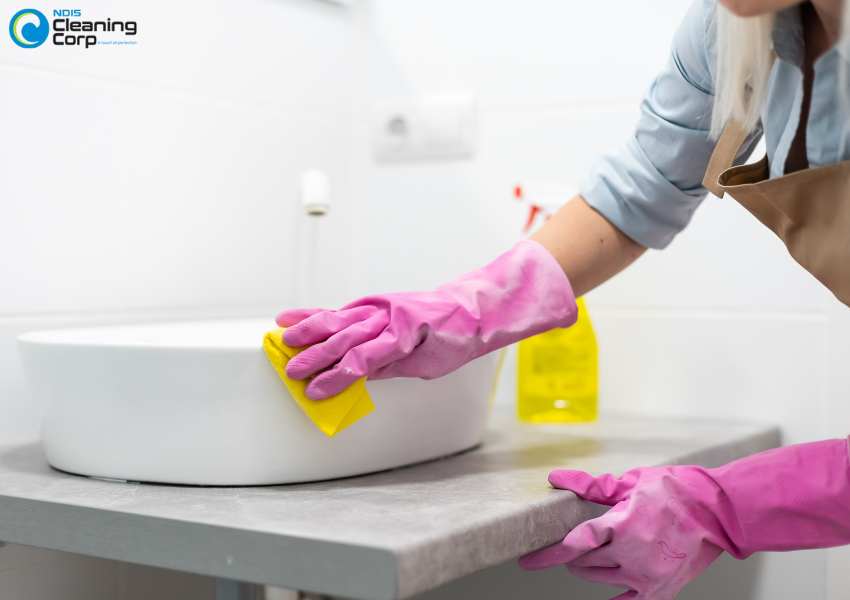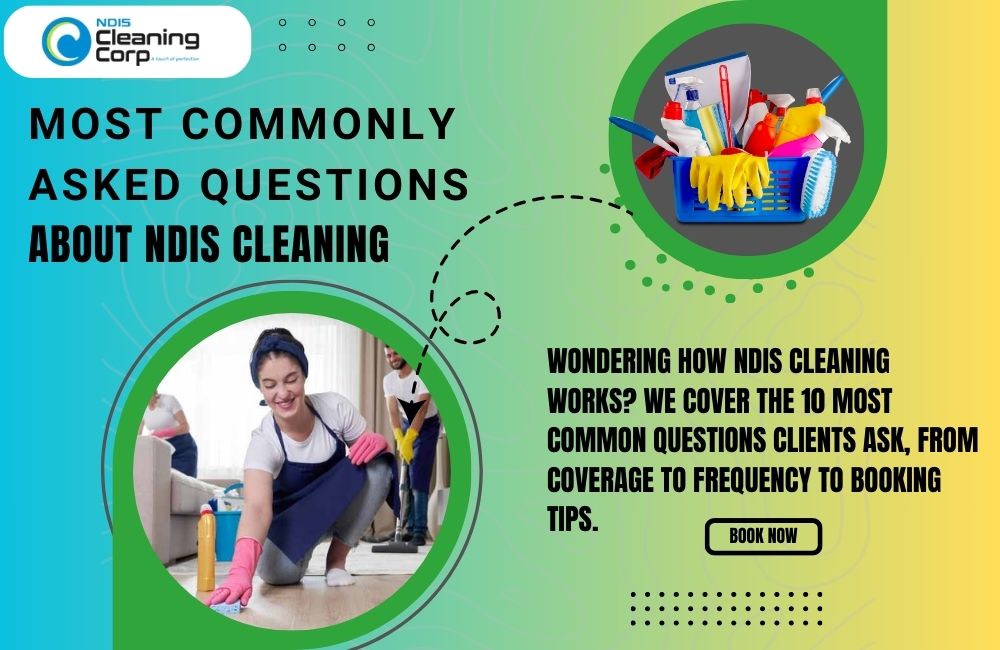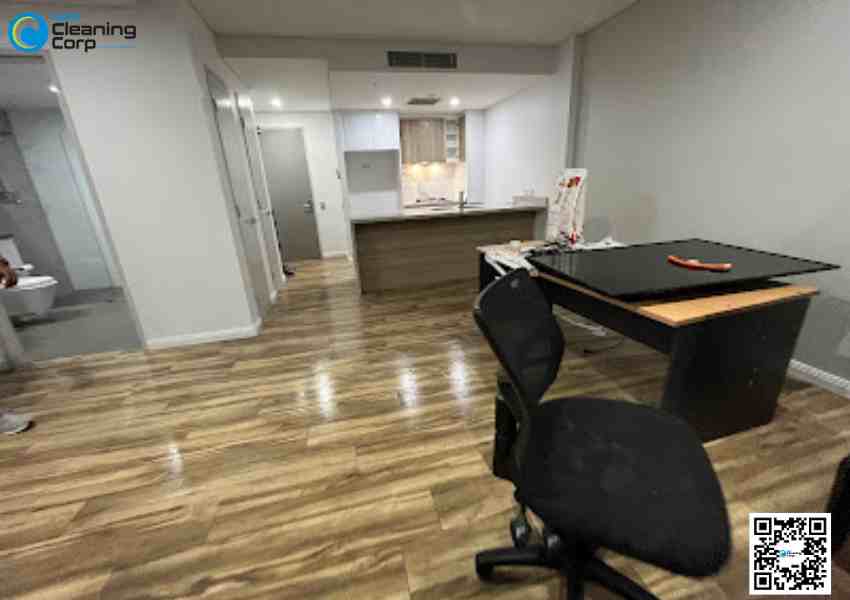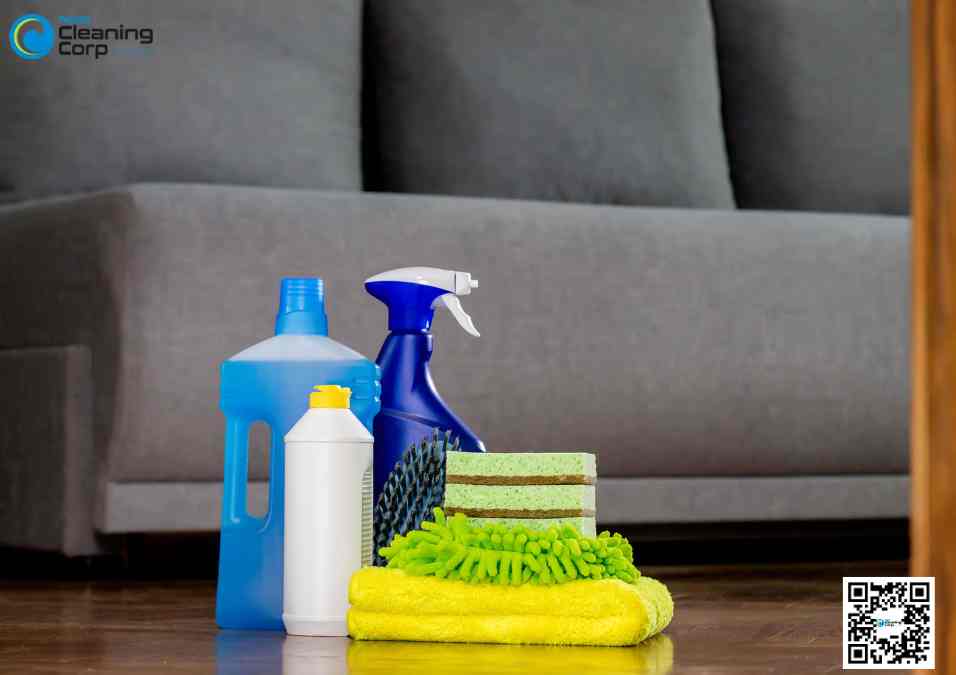Does the NDIS Fund Cleaning Services?
Yes. The NDIS does fund cleaning services — but it...
Supporting NDIS participants with specialized cleaning services for disabilities is not just about keeping a home tidy—it’s about improving the quality of life for those who need it the most.
Imagine living with a disability that makes it hard to complete daily tasks that many of us take for granted, like vacuuming or wiping down surfaces. For people with disabilities, a clean home is more than just a comfort; it’s a necessity for maintaining health and well-being. But maintaining that level of cleanliness can be challenging, especially when mobility restrictions or specific health needs are part of daily life.
Take Sarah, for example, a 45-year-old woman with multiple sclerosis. Sarah has always been fiercely independent, but as her condition progressed, she found that keeping up with cleaning became almost impossible. Dust would accumulate, and clutter would pile up in spaces she could no longer reach. This not only affected her physical health but also took a toll on her mental well-being. She felt overwhelmed and anxious about her living space.
That’s where NDIS-approved cleaning services come into play. These services are specifically tailored to meet the unique needs of people like Sarah, ensuring their homes remain clean, safe, and accessible. What’s great about these services is that they go beyond the regular cleaning you might expect. They’re designed to address the specific challenges that come with different disabilities, ensuring the home environment isn’t just clean but also functional for the person living there.
In this blog, we’ll delve into the ways these specialized NDIS cleaning services are making a difference in the lives of participants and how they can help create a healthier, more comfortable living space for people with disabilities.

When you think about cleaning services, you might imagine a crew coming in, wiping down counters, vacuuming, and leaving. But specialized cleaning services for NDIS participants are so much more than that. They are essential for creating an environment where individuals with disabilities can thrive—one that is safe, hygienic, and tailored to their specific needs.
Take, for instance, someone living with a spinal cord injury. Regular household cleaning might not be enough for them. They might need someone who understands how to clean around mobility aids or how to ensure there’s no clutter in pathways that could pose a trip hazard. NDIS-approved cleaning professionals are trained to handle these unique challenges. They know how to rearrange spaces so they’re not just clean but also accessible, giving participants a greater sense of independence in their own homes.
The services also address health-related concerns that regular cleaning crews might overlook. For instance, some participants are sensitive to certain chemicals found in standard cleaning products. This could trigger respiratory issues, skin allergies, or other health problems. A good NDIS cleaner knows how to use non-toxic, hypoallergenic cleaning supplies that are safe for individuals with specific health needs.
In essence, these specialized services are about more than just cleanliness. They focus on safety, health, and comfort, which are critical components of life for NDIS participants.
Let’s bring this to life with a few real-world examples.
Take Michael, a 30-year-old man with a severe respiratory condition. His NDIS-approved cleaner understands that strong scents or harsh chemicals can cause serious flareups for him. So instead of using standard products, they opt for non-toxic, fragrance-free cleaners that keep Michael’s home spotless without triggering his condition. This attention to detail means that Michael can breathe easier, literally and figuratively, knowing his home is both clean and safe for him.
Then there’s Claire, who uses a wheelchair. For Claire, it’s not just about making sure the floors are vacuumed or the dishes are done. Her cleaner needs to make sure that all of her living spaces are free of obstacles that might make it hard for her to navigate. This means wiping down low surfaces she can reach while also ensuring that high shelves or cupboards aren’t cluttered. Her cleaner is trained to recognize these unique challenges and to work around them, creating a space where Claire can move freely without fear of injury or frustration.
These examples highlight how specialized cleaning services are truly tailored to the specific needs of NDIS participants, ensuring their homes are not only clean but also functional and safe.
The benefits of a clean home go beyond aesthetics—NDIS cleaning services can have a profound impact on both physical and mental health. For many people with disabilities, maintaining a hygienic living space can be difficult, if not impossible, to do alone. Yet, the consequences of a dirty or cluttered home can be severe.
Let’s look at Sarah again. Before she started using NDIS cleaning services, she would often find herself catching colds or experiencing flare-ups in her condition. Dust, mold, and other allergens would build up in hard-to-reach places, making her home an uncomfortable environment to live in. Once she started using specialized cleaning services, she noticed a significant difference. The air felt fresher, and her symptoms lessened, simply because her living space was properly cleaned and sanitized on a regular basis.
This is a great example of how NDIS cleaning services can directly impact someone’s physical health. By reducing dust, mold, and bacteria, these services help prevent infections, allergic reactions, and other health issues that can arise from poor hygiene in the home.
But it’s not just about physical health. Having a clean, organized space can also have a positive impact on mental well-being. A cluttered or dirty home can contribute to feelings of anxiety, depression, or a sense of being overwhelmed. On the flip side, a clean and organized environment can foster a sense of calm, control, and mental clarity.
One of the biggest benefits of regular specialized cleaning services is that they prevent health issues before they become serious.
For example, in homes where dust and allergens build up, someone with asthma or another respiratory condition could experience more frequent attacks. By scheduling regular cleanings, these risks are minimized. NDIS cleaning professionals focus on high-traffic areas, sanitizing surfaces that often harbor germs, such as countertops, door handles, and bathroom fixtures. This is especially important for participants who may have weakened immune systems, where even a minor infection can lead to significant health complications.
The Role of NDIS in Funding Specialized Cleaning Services for Disabilities
The NDIS (National Disability Insurance Scheme) plays a vital role in ensuring that people with disabilities receive the support they need to live fulfilling, independent lives. One of the ways the NDIS does this is by funding specialized cleaning services that cater to the unique needs of participants. These services are not just about keeping a home tidy; they’re about creating a safe, comfortable, and healthy environment for individuals who may face physical, cognitive, or health-related challenges.
The beauty of the NDIS is that it recognizes the importance of personalized care. Every participant’s needs are different, and the NDIS provides flexible funding options that allow individuals to include specialized cleaning services in their care plan. Whether someone requires daily assistance due to severe mobility restrictions or just occasional deep cleaning to maintain a sanitary environment, the NDIS can cover these costs.
For example, there’s Emma, a 50-year-old woman with cerebral palsy. As her condition makes it difficult for her to handle basic housekeeping tasks, her NDIS plan manager worked with her to include cleaning services in her care plan. Now, she receives weekly visits from a professional cleaner who understands her specific needs, ensuring her home remains a comfortable and safe space where she can move around without obstacles. Without the support of the NDIS, accessing such specialized cleaning would have been financially challenging for Emma.
Accessing NDIS-funded cleaning services isn’t as complicated as it might seem, but it’s important to approach it the right way to ensure everything aligns with NDIS guidelines. If you’re a participant or a caregiver, the first step is to identify the need for specialized cleaning services as part of the care plan. You’ll need to demonstrate how the cleaning services directly relate to the participant’s disability and how they enhance their ability to live more independently and safely.
For instance, participants like Tom, who struggles with severe arthritis, may not be able to clean their home effectively. Tom’s NDIS plan manager requested funding for regular cleaning services, arguing that without this help, Tom’s home could become a risk to his health and safety. By presenting a clear case based on Tom’s needs, the funding was approved.
Once the NDIS approves funding, participants or their caregivers can search for NDIS-approved service providers in their area. Working with experienced providers who understand the intricacies of the NDIS ensures that all cleaning services are compliant with the guidelines, which helps avoid any administrative issues down the line. It’s always a good idea to consult with your NDIS plan manager during this process, as they can guide you through the options and connect you with the best service providers.
Finding the right cleaning provider is crucial because not all cleaning services are created equal—especially when working with NDIS participants who have very specific needs. When choosing a provider, it’s essential to look for one who not only understands disability services but also has professional training in providing tailored solutions for individuals with different abilities.
Think of David, a young man with autism who is highly sensitive to noise and specific smells. For him, a regular cleaning service might be overwhelming due to loud vacuum cleaners or strong chemical scents. However, when David’s family found an NDIS-approved cleaner who had experience working with individuals on the autism spectrum, everything changed. The cleaner used low-noise equipment and unscented, eco-friendly products that were much more comfortable for David. This kind of specialized service makes all the difference.
It’s important to look at the reputation of the provider as well. Reviews from other NDIS participants can offer valuable insights into how reliable, respectful, and professional a cleaning company is. In some cases, word-of-mouth recommendations from other families or caregivers can help you find the perfect match.
When searching for a cleaning provider that works with NDIS participants, there are a few key qualities to keep an eye out for. First, flexibility is important. Participants’ needs can change from week to week, and the right provider should offer scheduling options that fit around the participant’s life.
Second, look for providers who use eco-friendly products. Many NDIS participants may have sensitivities or health conditions that are aggravated by harsh chemicals. Cleaners who use non-toxic, hypoallergenic products create a safer environment for participants like Michael, whose asthma flares up with regular cleaning agents. A cleaner who understands these specific needs can make a world of difference.
Finally, always ensure that the provider is registered with the NDIS. This guarantees that they meet the necessary compliance standards and that their services can be covered under the participant’s NDIS funding. Compliance ensures quality and consistency in the services provided, giving peace of mind to participants and their families.
What types of cleaning services are available under the NDIS?
NDIS participants can access a range of cleaning services, including general household cleaning, deep cleaning, and sanitation services tailored for specific medical needs. For example, participants with compromised immune systems might require more frequent cleaning of high-touch surfaces like countertops and door handles.
Who is eligible for NDIS cleaning services?
Any NDIS participant whose disability limits their ability to clean or maintain their living environment is eligible for these services. This could include people with mobility restrictions, cognitive impairments, or health conditions that prevent them from cleaning effectively.
Are NDIS cleaning services available for shared living environments?
Yes, specialized cleaning services are available for participants in shared living environments. Each participant’s unique needs are taken into account, ensuring that all residents have access to a safe, clean, and functional living space.
Can participants choose their own cleaning provider?
Absolutely! Participants are free to choose any NDIS-approved cleaning provider that suits their specific needs and location. Working with a provider that’s the right fit can make a significant difference in the quality of the cleaning services and the overall comfort of the participant.
Supporting NDIS participants with specialized cleaning services is about much more than just keeping a home clean. It’s about providing dignity, safety, and well-being for individuals who may not be able to perform these tasks on their own. A clean, well-maintained living environment can significantly enhance both mental and physical health, allowing participants to live more comfortably and independently. By partnering with experienced, NDIS-approved cleaning providers, participants can rest assured knowing their homes are in good hands and their needs are being met in a way that truly supports their quality of life.

Yes. The NDIS does fund cleaning services — but it...

Alright, let’s get straight into it. These are the questions...

NDIS cleaning services are specifically designed to cater to the...

The role of professional cleaning in maintaining a safe and...

Studies consistently show that living in a clutter-free, organized space...